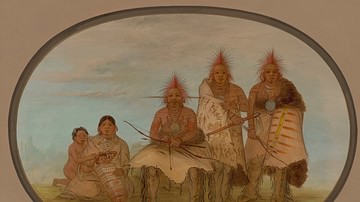Search
Did you mean: Temple?
Search Results

Definition
Xunzi
Xunzi (pronounced shund-zee, l. c. 310-c. 235 BCE) was a Confucian philosopher of the Warring States Period (c. 481-221 BCE) in China. He is also known as Hun Kuang, Hsun Tzu, Xun Tzu, and Xun Kuang. Xunzi translates as Master Xun and is...

Article
Eyewitness Accounts of the Holocaust
The Holocaust was the murder of 6 million Jewish people by the SS, Gestapo, and other organisations of Nazi Germany and its allies in the years prior to and through the Second World War (1939-45). Innocent men, women, and children were shot...

Article
Rationing in Wartime Britain
Rationing of food, clothing, petrol, and other essential items was introduced in Britain during the Second World War (1939-45) when the country's imports were severely threatened by German U-boat attacks on merchant shipping in the Atlantic...

Article
George W. Crooks' Account of the Dakota War of 1862
George W. Crooks' Account of the Dakota War of 1862 is a narrative of the events leading up to the "Minnesota Massacre" known as the Dakota War of 1862, given by the Dakota gentleman George W. Crooks (l. c. 1856-1947) in 1937 when he was...

Interview
Interview: The Wolf Den by Elodie Harper
In this interview, World History Encyclopedia is joined with Elodie Harper, the author of the novel The Wolf Den. Kelly (WHE): Do you want to start us off by telling us what the book is about? Elodie Harper (author): Hi, it is so nice to...

Definition
Mycenaean Civilization
The Mycenaean civilization flourished in the Late Bronze Age (c. 1700-1100 BCE), peaking from the 15th to the 13th century BCE. The Mycenaeans extended their influence throughout the Peloponnese in Greece and across the Aegean from Crete...

Definition
Mencius
Mencius (l. 372-289 BCE, also known as Mang-Tze or Mang-Tzu) was a Confucian philosopher during The Warring States Period in China (c. 481-221 BCE) and is considered the greatest after Confucius himself for his interpretation, formulation...

Article
Diasporic Communities in the Mediterranean & Beyond
A diaspora is a large group of people with a similar heritage or homeland who have since moved from their original homelands to another country. In terms of ethnicity, they share a common language, worldviews, myths, religious concepts and...

Definition
Pawnee
The Pawnee are a Native American nation of the Plains Indians culture originally from the region of modern Nebraska. Prior to the European colonization of the Americas, they were among the most powerful of the Plains Indian tribes numbering...

Article
Thucydides on the Plague of Athens: Text & Commentary
The Plague of Athens (429-426 BCE) struck the city, most likely, in 430 BCE before it was recognized as an epidemic and, before it was done, had claimed between 75,000-100,000 lives. Modern-day scholars believe it was most likely an outbreak...